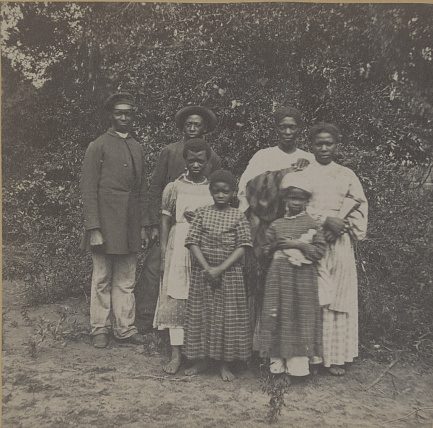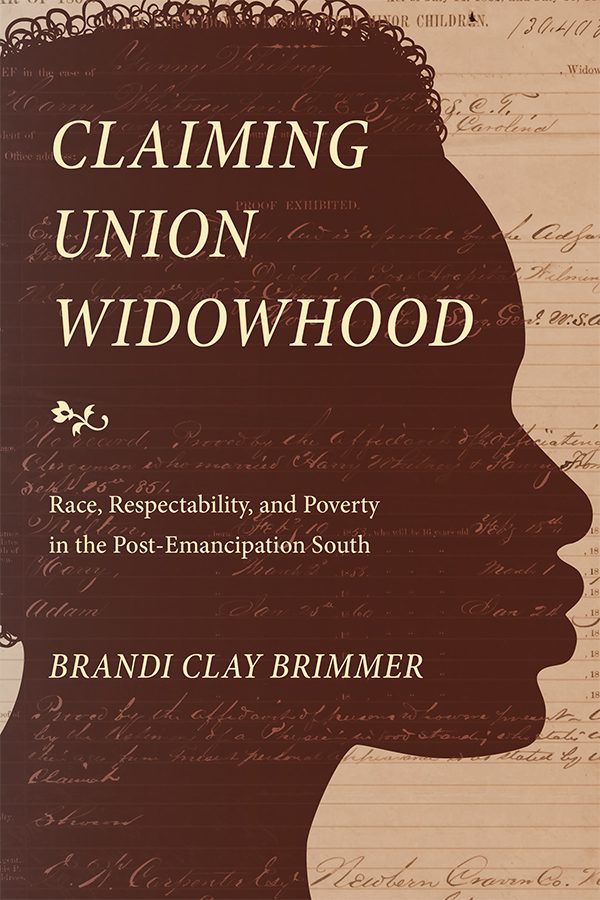Black Women and Union Widowhood: An Interview with Brandi Brimmer
This post is part of our online forum on Black Military Families in the Nineteenth Century.

Black Perspectives’ Senior editor, Holly Pinheiro, Jr. interviews Brandi C. Brimmer on her most recent publication of Claiming Union Widowhood: Race, Respectability, and Poverty in the Post-Emancipation South (Duke University Press, 2020). Brimmer is the Morehead-Cain Alumni Associate Professor in the Department of African, African American, and Diaspora Studies at the University of North Carolina at Chapel Hill. Her research recovers poor and working-class Black women’s battles for citizenship during the nineteenth century. Her monograph Claiming Union Widowhood received Honorable Mention from the ABWH Letitia Woods Brown Memorial Book Award for the best book in African American Women’s History. Her scholarly articles have appeared in the Journal of Southern History and the Journal of the Civil War Era. Prior to joining the faculty at UNC-CH, she taught at Morgan State University and Spelman College.
Holly Pinheiro, Jr. (HPJ): Most conversations around United States Colored Troops (USCT) soldiers center on wartime and postwar experiences of soldiers, but how does your work challenge that male-centric framing?
Brandi C. Brimmer (BCB): Claiming Union Widowhood offers a new interpretive framework of the emancipation and freedom narrative. I chronicle the collective struggle of Black women seeking benefits from the U.S. government based on their standing as the widows of men who served in the Union Army during the Civil War. Their petitions and the first-person testimony of those who supported them paint a vivid picture of their lives and labors as free people in a society that continued to marginalize Black women based on race and gender. In claiming the pensions to which they were in principle entitled, these women articulated a definition of citizenship that valued women’s work as caregivers and providers, while simultaneously challenging definitions of Union widowhood that cast them solely as the dependents of men. Making this argument, I reframe the history of the Civil War and Reconstruction era and challenge existing interpretations about the origins of social assistance that have neglected the grassroots struggles of Black women in the U. S. pension system. Because most of the women discussed in my study were formerly enslaved, I devote significant attention to understanding how slavery and freedom intertwined in Black women’s understanding of themselves as worthy widows.
The study also aims to think through the lives of Black soldiers’ wives and widows in the context of the communities they lived and came of age within; I wanted to know—to the extent possible—how they thought about themselves on their own terms and outside of the view of government agencies such as the Freedmen’s Bureau or the Pension Bureau.
Historians Thavolia Glymph and Stephanie McCurry explicate the implications of gender and Civil War policy in a series of writings. I address these questions within the context of the pension bureaucracy. Women’s ability to establish claims on the government rested on their ability to prove their marital relationship to the Bureau’s satisfaction. The U.S. Pension Bureau’s vision of the family was deeply rooted in heterosexual, middle-class, nuclear family norms. Some women struggled to present their family forms in terms legible to the Bureau. Others laid bare the devastation of family separation and sexual exploitation under slavery. Many presented Black family-making practices within their communities. For me, it was critical to step back and understand the implications of Black women recording their family histories within the Pension Bureaucracy and how they experienced the Bureau’s gaze into their personal lives.
HPJ: In your opinion, why are Civil Pensions excellent primary sources to uncover the lived experiences of families, including widows of deceased veterans?
BCB: The U.S. pension bureau was a key site where newly freed Black women engaged the federal government over poverty, redress, family sacrifice, and citizenship. Roughly 200,000 Black men served in the USCT (this number includes the 20,000 men who served in the Navy). One scholar estimates there were about 95K USCT veterans with pension cards. In some cases, these cards contained an application for the veteran, and some had only the application for the veteran’s widow, while many had both. (I think this is a conservative estimate because often times family members’ claims are embedded in a soldier’s case file) Petitions initiated by cooks, domestics, nurses, washerwomen, and laundresses shine the light on their views of gender, family, and marriage during the late-nineteenth century. As mentioned above, pension files also fill an important gap in Black family history because widow’s claims rested on their ability to prove their relationship to the soldier.
HPJ: How do the Black families that you examine challenge the Lost Cause narrative that seeks to exclude (or diminish) the Black Civil War era experience?
BCB: This is an important question that has both methodological and conceptual implications for how researchers think about Pension files. Black people presented evidence and made compelling claims about their wartime service and sacrifice. It makes me think of the case file of freedwoman Charlotte Banks. Her case file spans from 1869, the year she initiated her claim, through 1907, when she attempted to plead her case to the Department of Interior. Pension officials approved Charlotte’s application for survivors’ benefits in 1872 but removed her from the roster a year later for violating the Bureau’s “cohabitation law (remarriage act).” Fragmented pieces of Charlotte’s personal story of enslavement and survival in eastern North Carolina alongside her battle to regain her standing on the pension roster are recorded in her case file.
Charlotte Banks remains a touchstone for me because her strident effort to regain her standing on the roster—though rejected—stamped her husband’s service and her personal sacrifice onto the official record. In other words, even when Bureau officials rejected individual claims, the experiences, stories, and legacy of struggle are documented in the case files. Consequently, the case files of individuals like Charlotte Banks become even more important because they give us a better sense of newly freed Black people’s expectations of the government (and what they believed the government could or should do) over long stretches of time. As Charlotte Banks grew older her petitions became more specific and descriptive about the specific challenges she faced in her life.
HPJ: Why is it important to understand USCT widows’ pension applications as demands for U.S. Citizenship?
BCB: My ideas about the political realm have been deeply inspired by historian Elsa Barkley Brown’s scholarship and conceptualization of the Black public sphere; her insights have been foundational to my thinking about the politics and political dimensions of women’s claims and what I describe as the grassroots pension network. In mapping the grassroots pension network, I pay close attention to sites where newly freed Black women produced ideas about worthy womanhood and maintained their family histories. People passed information about the pension bureau, its rules, and the application process in their neighborhoods, on the streets, at church, and in other social spaces. Though excluded from the electoral arena, Black women forged a new relationship with the federal government by leveraging their standing as Union widows. Petitions filed by formerly enslaved Black women illuminate their views of citizenship and freedom making cultivated within their homes and communities.
The relationship Black women forged with the U.S. Pension Bureaucracy over the matter of survivors’ benefits became increasingly important for women as the White Supremacists violently moved to disfranchise Black men in southern states. This was especially true in eastern North Carolina, where poor Black women regularly tangled with pension examiners over the meaning of Union widowhood. Black women seeking survivors’ benefits experienced the personal dimensions of Reconstruction era politics and political in concrete terms.
Copyright © AAIHS. May not be reprinted without permission.


This perspective is so rich and important. I am curious to know a couple examples of the details Black women shared about their lives. But I also unserstand that I could read your book for those details, though it would be nice to get a brief sense here. I appreciate your refraiming of social assistance and looking at these written claims as reinscribing Black women and men into civil war history. I will definitely take a look at your work. Thank you
Such an enriching narrative that adds to the tapestry of our freedom struggle. Such research adds to how we understand our forms of family-making, healing, togetherness, community and citizenship. It also uncovers the culpability of the federal government’s systemic engagement in racist policy implementation. Looking forward to reading your book.